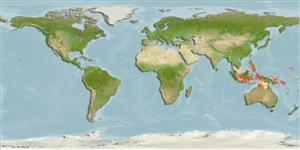Teleostei (teleosts) >
Gobiiformes (Gobies) >
Gobiidae (Gobies) > Gobiinae
Etymology: Trimma: Greek, trimma, -atos = something crushed (Ref. 45335); rubromaculatum: Named for the red spots on head and body..
Environment: milieu / climate zone / depth range / distribution range
Ecology
Marine; reef-associated; depth range 22 - 50 m (Ref. 48637). Tropical
Western Pacific.
Size / Weight / Age
Maturity: Lm ? range ? - ? cm
Max length : 3.5 cm SL male/unsexed; (Ref. 48637)
Short description
Identification keys | Morphology | Morphometrics
Dorsal spines (total): 7; Dorsal soft rays (total): 7 - 8; Anal spines: 1; Anal soft rays: 7. Most of lateral portion of head and body red while whitish ventrally; relatively large red spots scattered on head and body. Predorsal scales, 8. Head without scales except predorsal to posterior margin of interorbital; characterized further by lacking elongate dorsal spines; all pectoral rays unbranched; branched fifth pelvic ray; longitudinal scale series 24-25; depth of body 4.2-4.3 in SL (Ref. 90102).
Inhabits rubble slopes at the base of vertical cliffs. Typically hovers vertically or obliquely, several centimeters above the bottom (Ref. 31115).
Life cycle and mating behavior
Maturities | Reproduction | Spawnings | Egg(s) | Fecundities | Larvae
Allen, G.R. and P. Munday, 1995. Description of four new Gobies (Gobiidae) from the Western Pacific Ocean. Rev. Fr. Aquariol. 22(3-4):99-104. (Ref. 31115)
IUCN Red List Status (Ref. 130435)
Threat to humans
Harmless
Human uses
Tools
Special reports
Download XML
Internet sources
Estimates based on models
Preferred temperature (Ref.
123201): 27.7 - 28.5, mean 28.2 °C (based on 12 cells).
Phylogenetic diversity index (Ref.
82804): PD
50 = 0.5000 [Uniqueness, from 0.5 = low to 2.0 = high].
Bayesian length-weight: a=0.01023 (0.00477 - 0.02194), b=3.02 (2.84 - 3.20), in cm total length, based on LWR estimates for this (Sub)family-body shape (Ref.
93245).
Resilience (Ref.
120179): High, minimum population doubling time less than 15 months (Preliminary K or Fecundity.).
Fishing Vulnerability (Ref.
59153): Low vulnerability (10 of 100).
